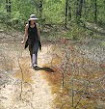"U of T's forestry school faces the axe" - The Globe and Mail.
The article is from April 1st. (apologies it slipped by me).
"Student Eric Jacobsen said “We do a lot more social and integrative approaches to forestry ...and it’s also less of an industry-focused program.”"
And a choice place to learn about urban forestry.
I'm dumbfounded.
Why compromise the capacity of a faculty that already exists?
And I can't imagine a worse time to do it.
To state the obvious: currently this city and cities across this country are dealing with massive urban reforestation commitments (variations of planting X# trees, &/or achieving X% canopy cover, by Y date). It seems to me that our best urban foresters are still struggling to figure out what those targets even mean, or should mean. Will it mean x% canopy cover that will last 30 or a 130 years? Which species: indigenous, native, exotic, invasive, GM'd, mass produced cheap clones? Beyond carbon sequestration, which ecological services should be integrated into those targets? And then, how to pull together the political will and the required resources to make make intelligent policies actually happen on the ground? This current surge of tree planting funding is a sudden and massive experiment, and a responsibility and opportunity happening on our watch. And so are its impacts on a changing mix of urban forestry stewardship orgs, private and public sector urban forestry industries and its professions. All of this at time when we know our urban forests are in ecological crises, e.g. degradation from historic and changing land uses, the challenge of reducing urban sprawl so we can retain ecological heritage and functions, the need to remediate post-industrial contamination in soil and groundwater, invasive species and climate change.
An intelligent continuing commitment to develop the skills and capacity necessary to understand, conserve, restore and engineer beneficial ecological function of our forests (urban and otherwis) can only help. Which leads me to wonder, if not now, when would be a more relevant and necessary time or opportunity for us /our universities, to support and study forestry?
18 April 2011
"U of T's forestry school faces the axe"
Subscribe to:
Post Comments (Atom)

2 comments:
The problem is that everybody cares about the environment but nobody wants to do anything about it.
We need smart minds to lead the way and the only way you are going to get those smart minds to take up conservation as a career is if the government offers them attractive jobs with handsome salaries.
good POV. thanks for offering it. :)
it reminds me of an answer i keep getting to a lot of conservation and ecology questions lately: "because there's no money it."
another answer i keep hearing, when i ask about best conservation and restoration policy and practises based-on-research and experience, is: "nobody knows."
well, we need to find out.
so here's the logic i'm hung on:
Since it's 'Our' collective natural heritage and ecology at stake, i think it's public $'s responsibility to fund it. And since Academia is heavily subsidized by public $ and our whole society is its greatest stakeholder, the universities and colleges should be responsible to public need. and functioning ecology (human-safe healthy air, water, soil/food, flood and pollution mitigation etc., essential to a functioning civil society) is an essential public need.
and then, yes, *gov's* must be responsible to "Our" needs too, an hiring well-trained folks.
instead i see cut backs there too.
short-term unsustainable policy.
i'm truly perplexed, and pissed-off, thinking: wow... *we won't even continue to fund our existing capacities to sustain our own species' health?*
Post a Comment